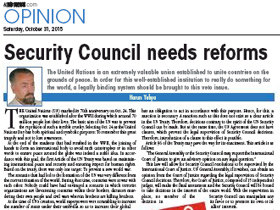
The United Nations (UN) marked its 70th anniversary on Oct. 24. This organization was established after the WWII during which around 70 million people lost their lives. The basic aim of the UN was to prevent the repetition of such a terrible cruelty. Selecting Oct. 24 as the United Nations Day has both spiritual and symbolic purposes: To remember this great tragedy and not to lose awareness.
At the end of the madness that had resulted in the WWII, the joining of hands to form an international body to avoid such catastrophes or in other words to ensure peace around the globe was indeed a noble idea. In accordance with this goal, the first Article of the UN Treaty was based on maintaining international peace and security and ensuring respect for human rights. Based on the treaty, there was only one target: To prevent a new world war.
The scenario that had led to the formation of the UN was very different from the current situation of the world. During that time, countries were at war with each other. Nobody could have had envisaged a scenario in which terrorist organizations are threatening countries within their borders, dictators murdering their own people and civil wars wherein brothers are killing brothers.
At the time of UN’s creation, world superpowers were scrambling to increase the number of states under their umbrella so as to increase their global influence and to promote their interests. That was why, the Security Council was charged to make important decisions on global affairs.
The Security Council consists of 15 members, 10 of whom are temporary elected for two years and five are permanent members. While nine votes are enough for the adoption of a decision, a veto from one of the five permanent members (the US, the UK, China, France and Russia) is enough for a decision to be rejected before it can even be discussed. As we criticized many times before, this veto right of those countries, which cannot find common ground on nearly anything, has prevented them from making decisions on various significant matters.
That is why, many issues requiring an immediate UN intervention, such as the Syrian civil war etc., continue to haunt the world.
This situation has long been a subject of criticism in the world and seems to be a hornets’ nest. Methods of criticism of presidents and opinion leaders to offer concrete solutions to these issues are not going beyond complaints. However, it is possible for the UN to find a solution by making its own laws and regulations.
Therefore, the existence of a judicial system to question the decisions of the Security Council is essential. United Nations Treaty Article 24/2 states, “In discharging these duties the Security Council shall act in accordance with the Purposes and Principles of the United Nations.”
Since the main purpose of the UN is to ensure peace, the Security Council has an obligation to act in accordance with this purpose. Hence, for this, a sanction is necessary. A sanction such as this does not exist as a clear article in the UN Treaty. Therefore, decisions contrary to the spirit of the UN Security Council can be made. But at the same time, the UN Agreement does not have clauses, which prevent the legal supervision of Security Council decisions. Therefore, introduction of a clause to this effect is possible.
Article 96 of the Treaty may pave the way for its enactment. This article is as follows:
“The General Assembly or the Security Council may request the International Court of Justice to give an advisory opinion on any legal question.”
This law will allow for Security Council resolutions to be supervised by the International Court of Justice. UN General Assembly, if it wishes, can obtain an opinion from the Court of Justice regarding the legal supervision of Security Council decisions. Therefore, the Court of Justice, composed of 15 independent judges, will make the final assessment and the Security Council will be bound to take decisions in the interest of the entire world. With the supervision in place, no member of the Security Council can manipulate any decision in its favor or to promote its own or its allies’ interests.
There were previous examples of this and the Court of Justice made assessments regarding the lawfulness of Security Council decisions. The problem is that these assessments are not any binding at this stage, in other words the Court of Justice is unable to cancel the decisions of the Security Council.
However, there is no obstacle in making a breakthrough in this aspect. The world’s current situation compels us to question the functionality of the structure formed by the conditions of the 1900s. The current situation, of course, requires a very strong built-in system of justice in the Court of Justice. Even though the Court of Justice cannot virtually influence Security Council decisions, it will always have deterrent effect over them. But of course, the Court of Justice should have the authority to cancel or modify the decisions of the Security Council, therefore should comprise of independent members that prioritize world peace.
The United Nations is an extremely valuable union established to unite countries on the grounds of peace. In order for this well-established institution to really do something for the world, a legally binding system should be brought to this veto issue. Of course, the next step should be to develop an effective educating mechanism rather than developing effective weapons to solve the conflicts and wars. This is topic for another article.
Adnan Oktar's piece on Arab News:


